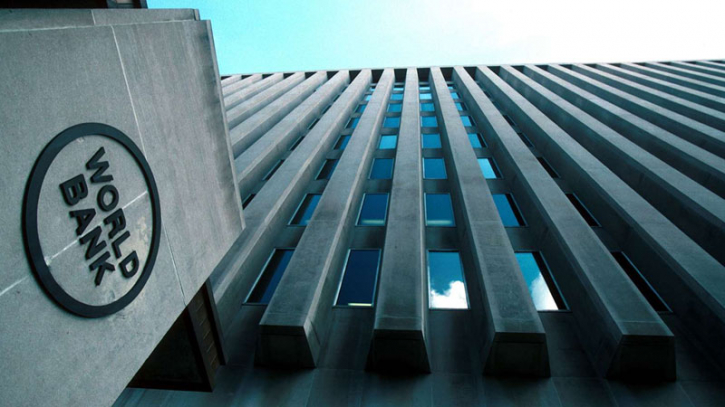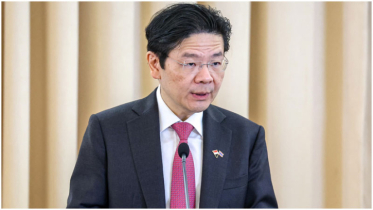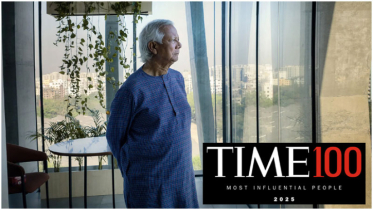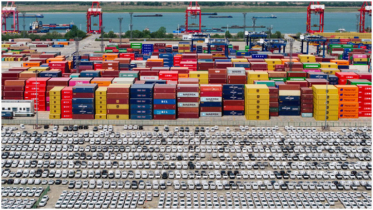Bangladesh on track to be a developed country by 2041:WB

South Asian rising economy Bangladesh has made a strong recovery from the coronavirus pandemic while the post pandemic economic recovery has supported the country in poverty reduction, said the World Bank.
The Washington based global lender in its latest 'Bangladesh Development Update - New Frontiers in Poverty Reduction' launched yesterday, said that the post-pandemic recovery was disrupted in FY23 with rising inflation, financial sector vulnerabilities, external pressure, and global economic uncertainties.
The Development Update was also launched simultaneously in other South Asian county director offices in India, Pakistan, Nepal, Sri Lanka, Bhutan and Maldives.
World Bank Country Director for Bangladesh Abdoulaye Seck spoke at the launching ceremony while senior country economist Bernard Haven and country economist Nazmus Sadat Khan jointly made a power-point presentation.
The report's companion piece, the latest South Asia Development Update - Toward Faster, Cleaner Growth, released today, also said South Asia is expected to grow by 5.8% this year-higher than any other emerging and developing region in the world, but slower than its pre-pandemic pace and not fast enough to meet its development goals.
The economy of Bangladesh in the current fiscal year (FY24) is forecasted to grow at 5.6% which is down by 0.6 percentage point from the earlier projection. The real GDP growth slowed to 6% in FY23 from 7.1% in the previous fiscal.
The World Bank projection for India in the current fiscal year is 6.3% which is 5.2% for the Maldives, 1.7% for Sri Lanka, 4% for Bhutan, 3.9% for Nepal and 1.7% for Pakistan.
Noting that the country has done extremely well in terms of managing the pandemic, World Bank country director said, "Bangladesh can count on the World Bank. Since 1972, we've provided over $40 billion to Bangladesh....we're ready to provide more technical assistance and financing so that Bangladesh can become an upper middle income country by 2031 and a developed country by 2041,"
Seck said Bangladesh should emphasize more on how to become more ambitious in terms of addressing the poverty goals.
He said it would be very important for Bangladesh to make sure that reforms are sustained as well as make reforms bolder and faster.
Highlighting the current macroeconomic situation of the country, he said that inflation may gradually subside, pressure on the economy from the external sector would be strong, and flexibility will help to check the declining trend of foreign currency reserve while cap on lending rate should be lifted to make more effective the monetary policy.
When asked about the latest report on offering financing to Bangladesh by the World Bank on high rates, Seck said that when a country aims at becoming a higher mid-income country by 2031 and a developed country by 2041, as well as aspires to raise per capita income, improve living standards of people, increase life expectancy and have clean air, then the country should go for the finance which is available to it.
He also said if that finance could help the country to get the returns which is higher than the interest rate which it has to pay, then it should go for it.
The World Bank country director opined that interest rate is being increased worldwide while it is important for countries like Bangladesh to mobilize more resources as below double digit tax to GDP ratio is not adequate.
Replying to another question, he said that delaying reforms has a cost adding that the policymakers need to accelerate reforms and should not delay reforms in the financial sector.
Answering to another question, the country director of the Washington-based lending agency said, "We can see reforms are happening...I think move is needed because the time we are in is not an ordinary time...given the time we are in, it is important to be bolder and faster in terms of reforms,"
When asked about the possible uncertainties centering the next general election, Seck said that election sometimes come up with some uncertainties while Bangladesh is not an isolated case. "But, the important thing is not to lose sight,"
Noting that it is important for the country to implement a very strong supervision of the banks, he said, "I will rank financial sector reforms as one of the must do things to do. The World Bank will be pleased to support Bangladesh in this regard,"
The latest Bangladesh Development Update said that reforms to address inflation, through monetary and fiscal policies, as well as financial sector vulnerabilities will be critical for the country to sustain growth and poverty reduction.
It said structural reforms like exchange rate flexibility, monetary policy modernization and revenue mobilization can accelerate growth.
A single market-based exchange rate would help attract foreign currency inflows through formal channels and support the balance of payment and reserve accumulation.
Supported by economic growth, Bangladesh improved living conditions and reduced extreme poverty to 5.0% in 2022 from 9.0% in 2016, which is comparable to Latin America and the Caribbean countries and fares better than the South Asian average.
The new poverty numbers are based on the international poverty line of $2.15 a day (using 2017 Purchasing Power Parity) and the Bangladesh Bureau of Statistics (BBS)'s Household Income Expenditure Survey 2022 and re-estimation for 2016.
"Bangladesh's progress in reducing poverty is multi-dimensional-it has improved poor people's wellbeing, including in reduced infant mortality and stunting, and improved access to electricity, sanitary toilets, and education. The rural areas witnessed faster poverty reduction than the cities and towns," said Abdoulaye Seck.
"Despite these gains, inequality has slightly narrowed in rural areas and widened in urban areas. The World Bank stands ready to support Bangladesh to take on urgent reforms to accelerate inclusive economic growth," he added.
The regional report forecasts growth to slow to 5.6% in 2024 and 2025 in South Asia, as post-pandemic rebounds fade and a combination of monetary tightening, fiscal consolidation, and reduced global demand weigh on economic activity.
Constrained by fiscal challenges, South Asian governments have limited room to help their economies fully capitalize on the global energy transition. For South Asia, the energy transition could present an opportunity for future growth and job creation-if it leads to more investments by firms, cuts air pollution, and reduces the reliance on fuel imports.
"South Asia's energy intensity of output is about twice the global average and the region lags in the adoption of more advanced energy-efficient technologies," said Franziska Ohnsorge, World Bank Chief Economist for South Asia.
.png)




